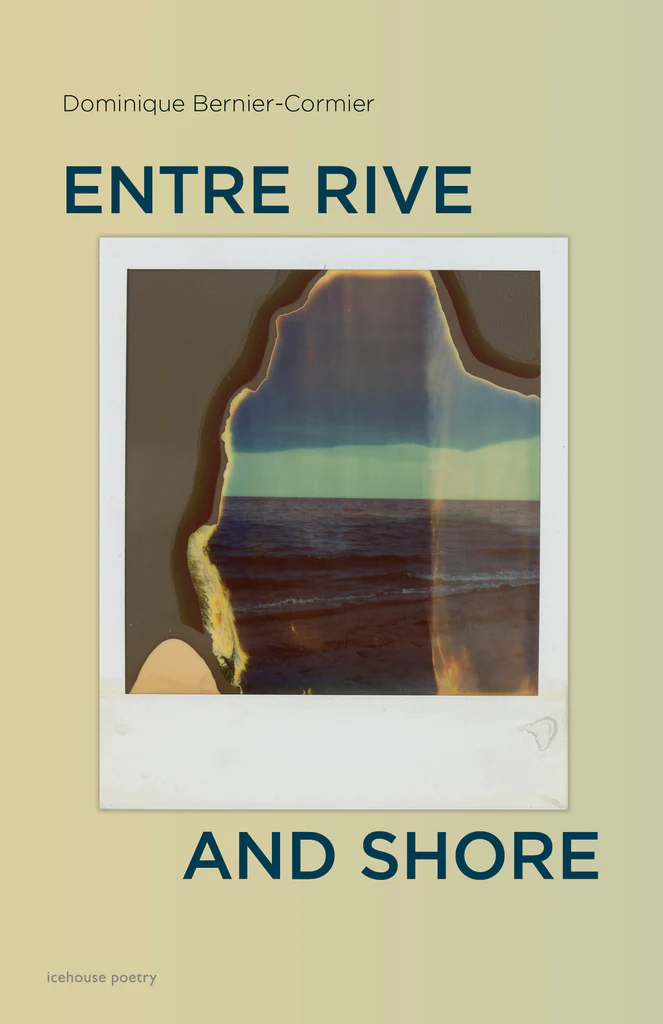It is often said that an essential quality of poetic writing is its immunity to translation. As Dante wrote in his Convivio: “nothing harmonized according to the rules of poetry can be translated from its native tongue into another without destroying all its sweetness and harmony.” Dominique Bernier-Cormier would, I think, agree with Dante’s image of translation as a form of violence, but what if one finds oneself born into a history that is already partitioned into languages, an identity whose forced confinement to a single language would seem as violent as any commerce between tongues? What if translation, rather than a vandal of harmony, became a necessary instrument for a more expansive poetics?

Goose Lane Editions, 2023.
You can think of Bernier-Cormier’s Entre Rive and Shore as an open-ended adaptation of an episode from the poet’s ancestral history. In 1755, the year the Acadian Expulsion began, Pierrot Cormier escaped from Fort Beauséjour disguised in a dress that his wife Nanette had smuggled into the British prison. As a result of what, in the book, comes to be thought of as Pierrot’s “translation” (from bondage, from masculinity, from British authority), his descendants did not proliferate among the Cajuns of Louisiana. In what he calls a “text stuck entre deux langues,” Bernier-Cormier orchestrates his own engagement with what was, what could have been, but also with what both is and isn’t, a hybridity that characterizes his sense of split belonging between languages.
The book works extremely well as a cohesive aggregation of related but varied parts. The backbone of the volume is a suite of attempted “retranslations” of Pierrot’s escape, some aspirationally literal, some more spatial and visually eccentric. To translate once and then again suggests a refusal to believe in the possibility of a definitive rendering. Bernier-Cormier annotates his translations, uncovering, as in an anatomy theatre, the inner workings of artistic decisions: “Stutter better than bégaye, the tongue skipping a step…but sanglot better than sob, wet blood in the throat.” One translation, he writes, feels “like combing a waterfall, then putting it in a braid.” Ultimately, the poet asserts his right to live in suspension between two languages, making use of translation, as well as mistranslation, as a contingent and reversible operation. The beauty of the hybrid form validates itself: “The bayou is an armurerie d’argile / where blades of sun aiguisent leur feu.” Central as those Pierrot variations are, Entre Rive and Shore offers a wealth of other material. Emails from the poet’s father restage conflicts of language and identity in a more contemporary dynamic. Gorgeous travelogues recount trips to Louisiana and New Brunswick. Playful impersonations and meditations extend the book’s dramatis personae to an eclectic roster of linguistic transgressors: Bernadette of Lourdes, Walter Anderson, the Oracle at Delphi, Mata Hari, the Young Thug of Jeffery. But what makes this book such a dazzling accomplishment is the combination of its completeness as an overarching project with its smaller-scale lustre on the level of individual images and lines (in a flooded room “Jellyfish floating near the ceiling like chandeliers”). I cannot remember the last time I read a work of Canadian poetry so assured that I was reading a future classic.
Bios

Joseph Kidney
Joseph Kidney won the Short Grain Contest from Grain, and The Young Buck Poetry Prize (now the Foster Poetry Prize) from CV2, and was nominated for a Canadian National Magazine Award. His poems appear in Best Canadian Poetry 2024 and elsewhere. His chapbook Terra Firma, Pharma Sea is available from Anstruther Press. [updated in 2024]

